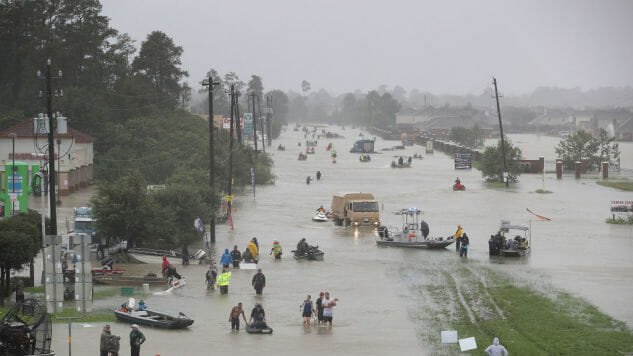After Harvey, Chemical and Industrial Threats Await
In the wake of the storm
Joe Raedle / Getty Politics Features Hurricane Harvey
The victims of Harvey will face manmade environmental dangers long after the storm recedes.
According to the Intercept, human-wrought storm-aided disasters are now part and parcel of the perils in Houston. Among these are toxic pollution. Texas communities which have long suffered from the output of neighboring refineries must now deal with the additional problems caused by the logical outgrowth of those refineries, global warming. Not to mention the “industrial contamination” produced by those plants, which have been let loose by the recent flooding:
A number of low-income communities that sit on the fence-lines of the Gulf Coast petrochemical industry have been hit particularly hard by Hurricane Harvey. On Thursday morning, Hilton Kelley stood at a makeshift first responders headquarters in Port Arthur, Texas, directing out-of-state rescue professionals to parts of his neighborhood where he knew people were probably still trapped. A curfew put in place from 10 p.m. to 6 a.m. was just ending and the streets were eery and barren, with a few alarms going off in nearby buildings. Kelley’s home had filled with a foot and a half of water, and his wife and granddaughter had taken shelter at his soul food restaurant, Kelley’s Kitchen.
The report noted that cities up and down the coast have sought defense against industry for years now:
The neighboring city of Beaumont is another community that has fought for protections against the emissions of industry. As The Intercept has reported, residents of Beaumont’s Charlton-Pollard community waited 17 years for an answer from the Environmental Protection Agency to a complaint about the nearby Exxon Mobil plant’s expansion. The Beaumont Exxon Mobil plant was damaged in the storm, releasing sulphur dioxide into the air. During the past week there have been at least 74 excess air pollution release events reported to the Texas Commission on Environmental Quality, totaling more than 1 million pounds of emissions above legal levels, according to reporting by the New Republic.
This is not merely a long-term issue, but an immediate problem. As Harvey continued to pour its wrath on the Texas coast, the nation heard reports of dangerous chemical reactions happening near Houston. A “crippled chemical plant” was said to be the culprit, although the EPA did not immediately “detect issues regarding toxic material.” Warning follows the deluge.
Per the Post:
Authorities warned of the danger posed by the plant in Crosby, about 30 miles northeast of Houston. The French company operating the plant said explosions were possible, and William “Brock” Long, administrator of the Federal Emergency Management Agency, called the potential for a chemical plume “incredibly dangerous.” Still, officials offered differing accounts regarding what occurred at the Crosby plant, which makes organic peroxides for use in items such as counter tops and pipes. The plant’s operators, which had earlier Thursday reported explosions, later said they believe at least one valve “popped” there, though they noted it was impossible to know for sure since all employees had left the site. … In Crosby, two blasts rocked the chemical plant that had been left without power by floodwaters, according to the facility’s French operators. “We were notified by the Harris County Emergency Operations Center of two explosions and black smoke coming from the” plant, the company, Arkema, said in its initial statement.
Whatever Mother Nature does, we should not compound the injury. The nation needs to keep a close eye on our infrastructure, and see that our own creations do not add to the weight of the ongoing disaster in Texas. What Harvey has left undone, we must not do in turn.